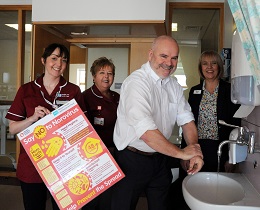 DURING the winter months, infections such as Norovirus (vomiting bug) are very common and easily spread.
DURING the winter months, infections such as Norovirus (vomiting bug) are very common and easily spread.
The Western Trust is asking everyone to help stop the spread of infection by following a few simple steps.
A spokesperson said: “Visitors should not visit hospital if they or any of their family at home has vomiting, diarrhoea, coughs, cold, flu or any other infectious conditions.
“Please wait until at least 48 hours or two days from symptoms have ended before you visit the hospital.
“Hand hygiene is the most important method of preventing and controlling the spread of infections and it is extremely important that all visitors wash their hands with liquid soap and water before and after visiting.
“When visiting your relative or friend, please do not sit on their bed or touch any equipment that is around them.
“Children under two should not visit any ward.
“Visitors are also reminded to visit only one patient or one ward whilst at the hospital and not move from ward to ward when visiting, as this can increase the risk of the spread of infection.
 Dr Dermot Hughes, Western Trust Medical Director said: “We are asking for the public’s help to prevent and control the spread of infections in our hospitals.
Dr Dermot Hughes, Western Trust Medical Director said: “We are asking for the public’s help to prevent and control the spread of infections in our hospitals.
“Good hand hygiene is central to this and it still remains the simplest, most effective method of preventing the spread of infection.”
Dr Hughes continued: “Despite the best efforts of the Trust to prevent and reduce the spread of infection, in December last year the Western Trust encountered one of the worst outbreaks of norovirus in many years.
“During this time there was also a general increase in the number of the general public in the community who were affected by symptoms of norovirus.
“The disruption caused by the norovirus outbreaks affected both patients and staff and had a severe impact on the day-to-day running of the hospital.
“In order to try to minimise the potential for outbreaks this year we are asking for the commitment from each individual patient, visitor and member of staff by following our simple steps, to ensure that infection prevention and control is a fundamental priority.”
Tags:




